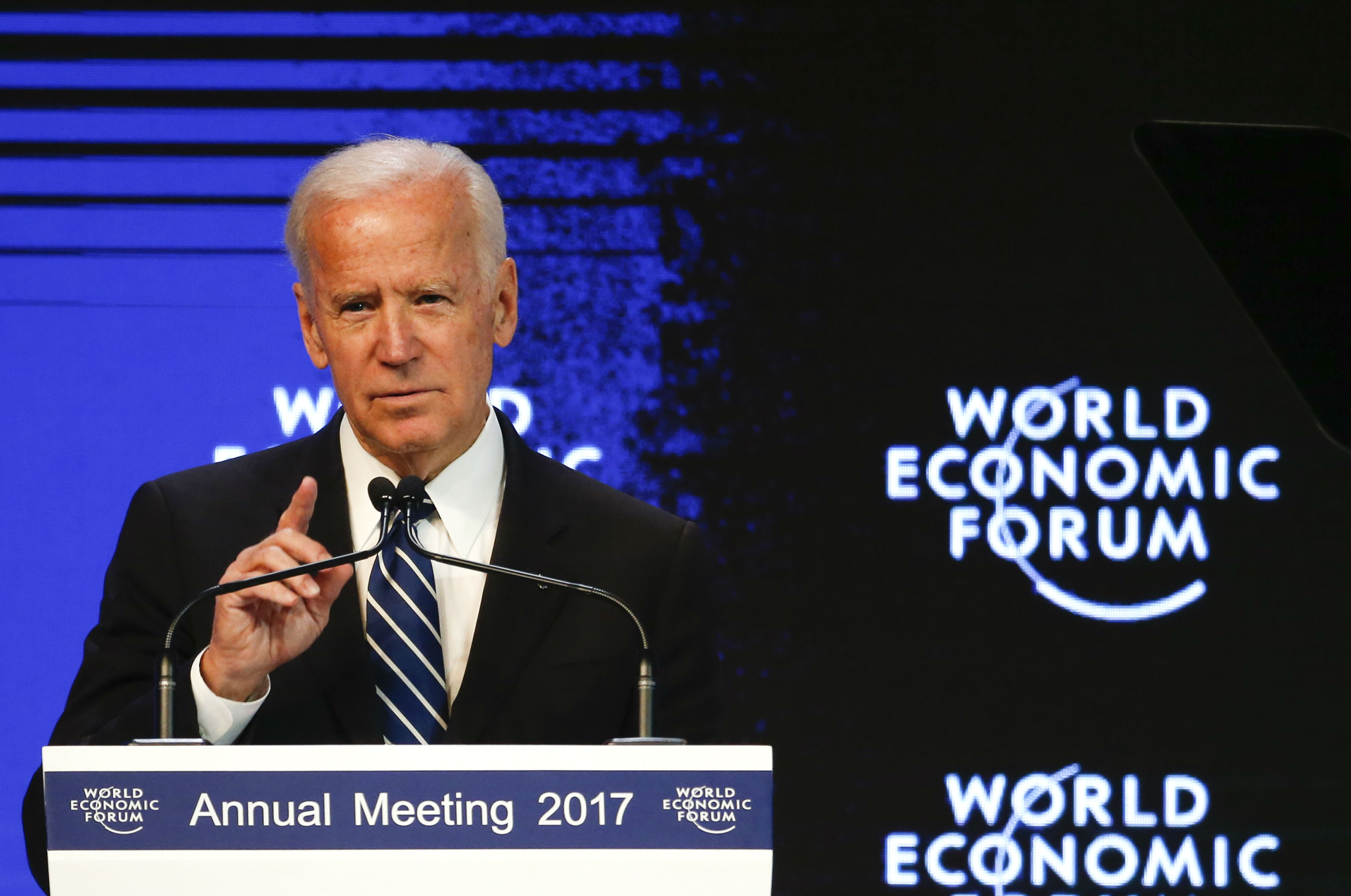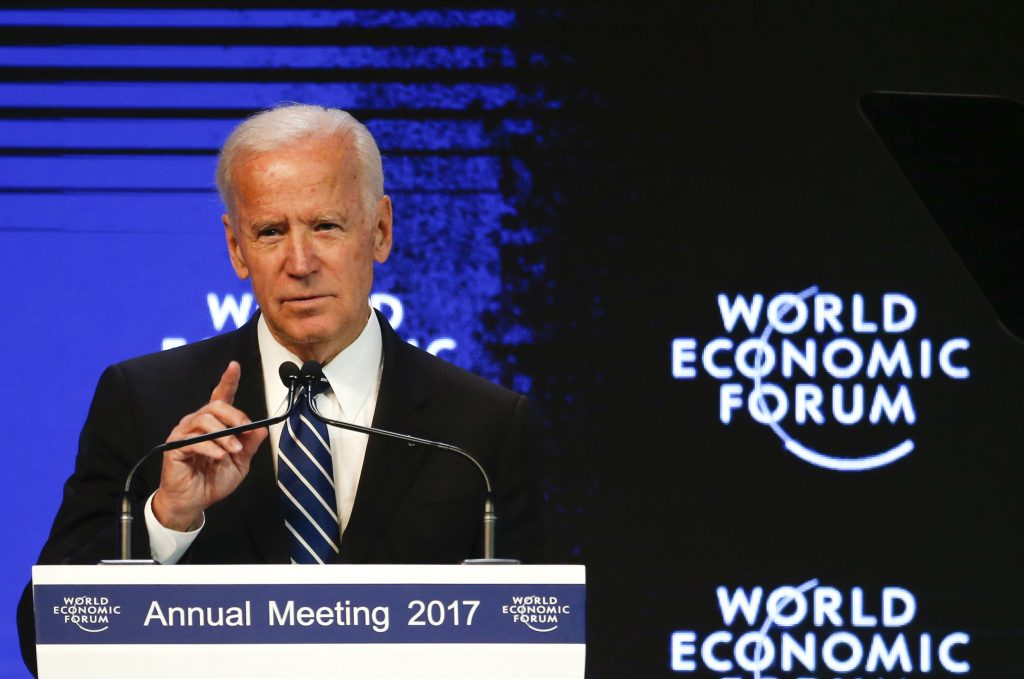 Former Vice President Joe Biden’s last official speech was delivered January 18 in Davos at the World Economic Forum. It was a tour de force summoning leaders to protect the “liberal international order” against China, Iran, Russia, and others bent on destroying it.
Former Vice President Joe Biden’s last official speech was delivered January 18 in Davos at the World Economic Forum. It was a tour de force summoning leaders to protect the “liberal international order” against China, Iran, Russia, and others bent on destroying it.
“This movement is principally led by Russia, working with every tool to whittle away at the European project, test fault lines, and return to politics defined by spheres of influence,” he said. “The United States, NATO allies, and Europe are responsible to beat back the challenges at our door now… We must stand with Ukraine.”
Many worry that the new Trump government will lay aside alliances that have kept the peace throughout the world since the Second World War.
Geopolitical and trade uncertainty was why Biden was only one of three political leaders who delivered keynotes at Davos this year; others were China’s Xi Jinping who defended global trade and Britain’s Theresa May who defended Brexit. But the longest shadows were cast by the absentee leaders, Presidents Donald Trump and Vladimir Putin.
A Trump interview with a British newspaper before the Forum suggested that he may scrap sanctions against Russia concerning Ukraine’s occupation if Putin reduces his nuclear arsenal. There was no mention of forcing a withdrawal from Ukraine.
A day later, British Defense Secretary Michael Fallon stated that Britain would stand alongside Ukraine in its confrontation with Russia because its freedom could not be “traded” for other concessions.
Ukrainian President Petro Poroshenko did not speak in Davos but attended and told reporters he was optimistic that Trump would stay the course with sanctions given supportive statements from Trump’s nominees.
A private breakfast event about Ukraine featured former US Defense Secretary Robert Gates who was blunt in his remarks about Putin. The session was off the record, but he gave me permission to publish an anecdote.
In 2001, former President George W. Bush infamously described Putin as “trustworthy” and said he looked into his eyes and “was able to get a sense of his soul.” Gates said he later told the president that “I looked into Putin’s eyes and I saw a stone cold killer.”
Modern history shows that every new president attempts to reset the Russian relationship and that Putin is not to be trusted. Bush established cordial relations until 2008 when Russia invaded part of Georgia while the world was distracted with the Beijing Olympics.
Obama reached out too, but in 2014 Russia invaded Ukraine while the world was distracted during the Sochi Olympics.
The difference was that the counter-actions in Georgia by the Republican regime were dramatic and prevented Russia from gobbling up more territory. The United States provided direct military support by transporting Georgian troops from Iraq to home, monitoring Georgia’s air space, and threatening escalation with the placement of the flagship of the US Fifth Fleet in the Black Sea.
Unfortunately in 2014, the Obama administration did nothing militarily as Russian saboteurs created conditions that set the stage for an occupation of nine percent of Ukraine by Russian soldiers and equipment.
Sanctions followed, but by then Russia’s military presence was secured and a phony referendum was staged in Crimea.
Ever since, Ukraine has fought a war against Russia and has built the second largest army in Europe of 400,000 to do so. Fighting continues and thus far 10,000 Ukrainians have died, the country’s industrial base has been destroyed, and an estimated 1.4 million persons have had to flee their homes. Sanctions are there to punish and stop Putin’s predation.
Sanctions haven’t impeded his aggression, but scrapping them would be a green light to Putin to push further into Ukraine and the Baltics. Appeasement or capitulation will lead to 2008 and 2014 all over again. Sanctions must stay until he withdraws from Ukraine’s Crimea and Donbas regions and pays billions in damages.
Fortunately for Trump, Putin is in a corner. Moscow is months away from running out of foreign reserves because of sanctions and low oil prices.
In 2017, the world awaits another Russian reset by a new American President, but Ukrainians remain resolute following their peaceful revolution in 2014 that unseated their corrupt Russian-controlled President.
At an event held in Davos by Ukrainian businesses to attract investors to its booming IT and export sectors, one organizer said: “We cannot be thrown under the bus. We want to be European. We are paying the price in blood. We will continue to pay the price in blood. All we need are sanctions against Russia and lethal weapons so we can push the Russian soldiers and tanks out of our country.”
Diane Francis is a Senior Fellow at the Atlantic Council’s Dinu Patriciu Eurasia Center, Editor at Large with the National Post in Canada, a Distinguished Professor at Ryerson University’s Ted Rogers School of Management, and author of ten books.
Image: Joe Biden, former Vice President of the United States speaks at the annual meeting of the World Economic Forum (WEF) in Davos, Switzerland January 18, 2017. REUTERS/Ruben Sprich
